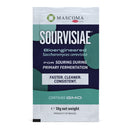Description
Brewer’s Yeast for souring during primary fermentation.
Sourvisiae is a bioengineered ale yeast strain (Saccharomyces cerevisiae) capable of producing lactic acid during fermentation. Sourvisiae contains a single genetic modification, a lactate dehydrogenase gene from a food microorganism, which enables the yeast to produce high levels of lactic acid during fermentation.
Sourvisiae contains a single genetic modification, a lactate dehydrogenase gene from a food microorganism, which enables the yeast to produce high levels of lactic acid, the main compound that gives sour beers their flavor. Sourvisiae allows the brewer to ferment and sour the beer in one simple step, reducing cross-contamination risks, lowering costs, cutting total process time, and allowing brewers to obtain a consistent product. The brewing process is conducted without any modifications; Sourvisiae is pitched just like conventional yeast and ferments in a normal fermentation time. Sourvisiae does not produce other flavor compounds associated with Brettanomyces, Lachancea, or Lactic Acid Bacteria, providing a cleaner and more reproducible souring process, with much shorter fermentation times.
Sourvisiae Yeast Features:
- Beer Styles: Sour Ales, Berliner Weisse, Gose
- Aroma: Tangy, Sour, slightly fruity
- Ideal Fermentation Temperature: 50–72°F
- Flocculation: Med - High
- Attenuation: Medium to High Attenuation. Attenuation may appear lower due to the formation of lactic acid. Production of lactic acid does not result in a loss of CO2. When sugar is consumed to produce lactic acid, there is no change in density. Therefore, the amount of residual sugar in the finished beer is lower than the final density would imply.
- Alcohol Tolerance: 12%
- Final pH: 3.0-3.2, Lactic acid concentrations of 8-15g/L
Payment & Security
Your payment information is processed securely. We do not store credit card details nor have access to your credit card information.


